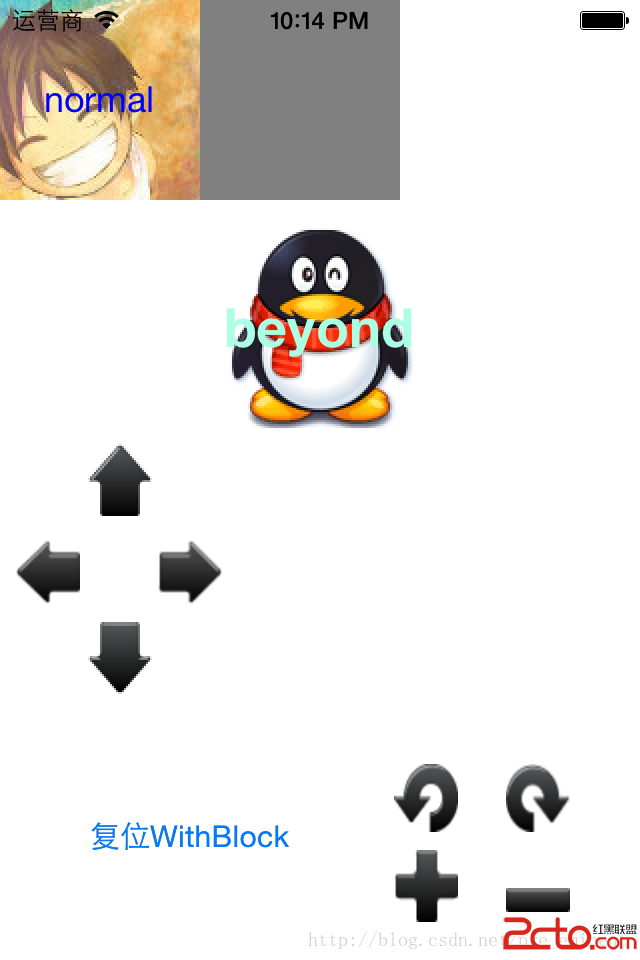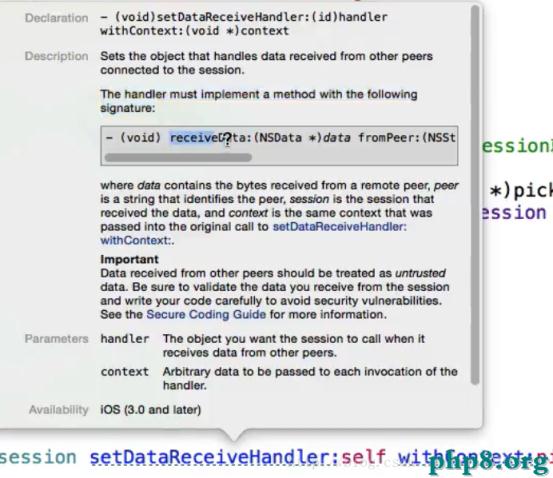IOS 圖文混排(CoreText.framework)詳解及實例
編輯:IOS開發綜合
IOS 圖文混排(CoreText.framework)
本文主要介紹了IOS圖文混排的資料,這裡整理了在網上查找的內容,幫助理解,掌握這部分知識,以下就是整理的內容:
利用CORETEXT進行圖文混排。
實現代碼:
void RunDelegateDeallocCallback( void* refCon ){
}
CGFloat RunDelegateGetAscentCallback( void *refCon ){
NSString *imageName = (NSString *)refCon;
return 80;//[UIImage imageNamed:imageName].size.height;
}
CGFloat RunDelegateGetDescentCallback(void *refCon){
return 0;
}
CGFloat RunDelegateGetWidthCallback(void *refCon){
NSString *imageName = (NSString *)refCon;
return 100;//[UIImage imageNamed:imageName].size.width;
}
先設置一個CTRun的委托,主要是用於指定對象的上行高,寬,或上下文釋放時使用。
-(void)drawCharAndPicture
{
CGContextRef context = UIGraphicsGetCurrentContext();
CGContextSetTextMatrix(context, CGAffineTransformIdentity);//設置字形變換矩陣為CGAffineTransformIdentity,也就是說每一個字形都不做圖形變換
CGAffineTransform flipVertical = CGAffineTransformMake(1,0,0,-1,0,self.bounds.size.height);
CGContextConcatCTM(context, flipVertical);//將當前context的坐標系進行flip
NSLog(@"bh=%f",self.bounds.size.height);
NSMutableAttributedString *attributedString = [[[NSMutableAttributedString alloc] initWithString:@"請在這裡插入一張圖片位置"] autorelease];
//為圖片設置CTRunDelegate,delegate決定留給圖片的空間大小
NSString *imgName = @"img.png";
CTRunDelegateCallbacks imageCallbacks;
imageCallbacks.version = kCTRunDelegateVersion1;
imageCallbacks.dealloc = RunDelegateDeallocCallback;
imageCallbacks.getAscent = RunDelegateGetAscentCallback;
imageCallbacks.getDescent = RunDelegateGetDescentCallback;
imageCallbacks.getWidth = RunDelegateGetWidthCallback;
CTRunDelegateRef runDelegate = CTRunDelegateCreate(&imageCallbacks, imgName);
NSMutableAttributedString *imageAttributedString = [[NSMutableAttributedString alloc] initWithString:@" "];//空格用於給圖片留位置
[imageAttributedString addAttribute:(NSString *)kCTRunDelegateAttributeName value:(id)runDelegate range:NSMakeRange(0, 1)];
CFRelease(runDelegate);
[imageAttributedString addAttribute:@"imageName" value:imgName range:NSMakeRange(0, 1)];
[attributedString insertAttributedString:imageAttributedString atIndex:4];
//換行模式
CTParagraphStyleSetting lineBreakMode;
CTLineBreakMode lineBreak = kCTLineBreakByCharWrapping;
lineBreakMode.spec = kCTParagraphStyleSpecifierLineBreakMode;
lineBreakMode.value = &lineBreak;
lineBreakMode.valueSize = sizeof(CTLineBreakMode);
CTParagraphStyleSetting settings[] = {
lineBreakMode
};
CTParagraphStyleRef style = CTParagraphStyleCreate(settings, 1);
// build attributes
NSMutableDictionary *attributes = [NSMutableDictionary dictionaryWithObject:(id)style forKey:(id)kCTParagraphStyleAttributeName ];
// set attributes to attributed string
[attributedString addAttributes:attributes range:NSMakeRange(0, [attributedString length])];
CTFramesetterRef ctFramesetter = CTFramesetterCreateWithAttributedString((CFMutableAttributedStringRef)attributedString);
CGMutablePathRef path = CGPathCreateMutable();
CGRect bounds = CGRectMake(0.0, 0.0, self.bounds.size.width, self.bounds.size.height);
CGPathAddRect(path, NULL, bounds);
CTFrameRef ctFrame = CTFramesetterCreateFrame(ctFramesetter,CFRangeMake(0, 0), path, NULL);
CTFrameDraw(ctFrame, context);
CFArrayRef lines = CTFrameGetLines(ctFrame);
CGPoint lineOrigins[CFArrayGetCount(lines)];
CTFrameGetLineOrigins(ctFrame, CFRangeMake(0, 0), lineOrigins);
NSLog(@"line count = %ld",CFArrayGetCount(lines));
for (int i = 0; i < CFArrayGetCount(lines); i++) {
CTLineRef line = CFArrayGetValueAtIndex(lines, i);
CGFloat lineAscent;
CGFloat lineDescent;
CGFloat lineLeading;
CTLineGetTypographicBounds(line, &lineAscent, &lineDescent, &lineLeading);
NSLog(@"ascent = %f,descent = %f,leading = %f",lineAscent,lineDescent,lineLeading);
CFArrayRef runs = CTLineGetGlyphRuns(line);
NSLog(@"run count = %ld",CFArrayGetCount(runs));
for (int j = 0; j < CFArrayGetCount(runs); j++) {
CGFloat runAscent;
CGFloat runDescent;
CGPoint lineOrigin = lineOrigins[i];
CTRunRef run = CFArrayGetValueAtIndex(runs, j);
NSDictionary* attributes = (NSDictionary*)CTRunGetAttributes(run);
CGRect runRect;
runRect.size.width = CTRunGetTypographicBounds(run, CFRangeMake(0,0), &runAscent, &runDescent, NULL);
NSLog(@"width = %f",runRect.size.width);
runRect=CGRectMake(lineOrigin.x + CTLineGetOffsetForStringIndex(line, CTRunGetStringRange(run).location, NULL), lineOrigin.y - runDescent, runRect.size.width, runAscent + runDescent);
NSString *imageName = [attributes objectForKey:@"imageName"];
//圖片渲染邏輯
if (imageName) {
UIImage *image = [UIImage imageNamed:imageName];
if (image) {
CGRect imageDrawRect;
imageDrawRect.size = image.size;
imageDrawRect.origin.x = runRect.origin.x + lineOrigin.x;
imageDrawRect.origin.y = lineOrigin.y;
CGContextDrawImage(context, imageDrawRect, image.CGImage);
}
}
}
}
CFRelease(ctFrame);
CFRelease(path);
CFRelease(ctFramesetter);
}
效果:
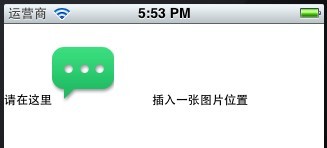
從上面看大家可能沒有發現什麼問題,當把圖片放在字的最左邊會是什麼樣子的?
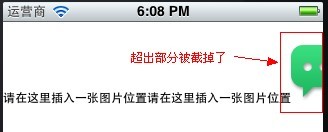
因此為了避免這種情況發生,我在代碼中添加了換行模式。添加換行後的效果:
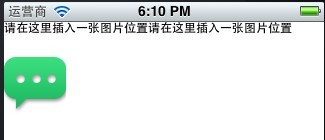
感謝閱讀,希望能幫助到大家,謝謝大家對本站的支持!
相關文章
+
